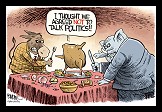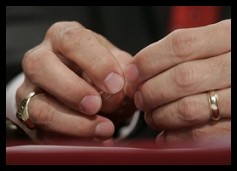A Leading Election Integrity Advocate Speaks Out Against 7 Serious Failures in the Latest Holt Election Reform Bill ...
Guest blogged by Ellen Theisen, Co-Director of VotersUnite.Org
(This is the first of a two-part series. Tomorrow: An excerpt from the author's companion article, “Senator Feinstein’s Election Reform Bill: A Constitutional Heresy,” describing even graver concerns about S. 1487, a bill recently introduced in the Senate.)
In September of 2003, when I was working with VerifiedVoting, Greg Dinger, Keone Kealoha, and I coordinated the first national activist effort in the current grassroots election integrity movement. We had a calling campaign to get more co-sponsors for Representative Rush Holt’s (D-NJ) election reform bill, then called HR 2239. In two months, the number of co-sponsors more than doubled — from 29 to 61. After the disastrous November 2003 Fairfax, Virginia, election, we rejoiced when Republican Representative Tom Davis (R-VA) signed on and the bill became bipartisan. By the end of 2003, there were 94 co-sponsors.
But Rep. Bob Ney (R-OH) was chairman of the House Administration Committee, and the bill never even got a hearing. Nor did Holt’s subsequent version of the bill in the 109th Congress, HR 550. But this year’s bill in the 110th, HR 811, has been marked up in committee and is expected to soon come to the House floor for a vote. This should be a time for celebration for me, but it’s not.
After more than three years of supporting election reform bills introduced by Representative Rush Holt, I am saddened to see the many severe flaws in the version of HR 811 as it was passed out of committee last month. This year’s bill had serious flaws when it was introduced in January. Primarily, it failed to accommodate a nearly unanimous agreement among citizen activists and computer scientists who have watched election disasters over the past three years — the agreement that electronic voting machines (DREs) should not be used in U.S. elections. I worked with many people to try to get an amendment requiring a paper ballot, one that was actually to be counted, for every vote cast. To my mind, that one significant improvement would have been worth tolerating the other flaws.
But the bill that was passed out of committee still allows for invisible, unverifiable, electronic ballots on DRE touch-screens as the official ballot for the all-important initial count where electronic voting systems are used. Adding a "paper trail" to those machines makes no real difference. Voters still can’t verify the electrical charges that make up the ballots that are counted on Election Night by the DRE.
In addition to other flaws that remained in the bill as it came out of committee, some changes removed valuable safeguards from the bill, and other changes introduced new problems. (Both versions of the bill can be viewed by inputting "HR 811" at the government's legislation search engine, Thomas.gov. The complete text of the current version is here. )
In my opinion, HR 811 will cause more problems than it will solve.
My primary objection is the extreme shift in the concept of “democracy” that the bill institutes legally. Specifically, it gives a federal stamp of approval to “ballots” that will never be counted, and it endorses secret vote-counting.
Let me explain seven of the bill's severe failures....
--- Click here for REST OF STORY!... ---
 If he's confirmed, Attorney General nominee Eric Holder told the U.S. Senate Judiciary Committee during confirmation hearings today, he'll review the Bush U.S. Attorney's decision to not prosecute former DoJ Civil Rights attorney Bradley Schlozman for his grotesque bastardization and politicization of the department as we detailed earlier this week. Schlozman, the DoJ's Inspector General found, broke federal law and custom vis a vis his hiring practices of only fellow whack-a-doodle wingnuts, and further went on to lie to Congress about during hearings (which is also a federal crime).
If he's confirmed, Attorney General nominee Eric Holder told the U.S. Senate Judiciary Committee during confirmation hearings today, he'll review the Bush U.S. Attorney's decision to not prosecute former DoJ Civil Rights attorney Bradley Schlozman for his grotesque bastardization and politicization of the department as we detailed earlier this week. Schlozman, the DoJ's Inspector General found, broke federal law and custom vis a vis his hiring practices of only fellow whack-a-doodle wingnuts, and further went on to lie to Congress about during hearings (which is also a federal crime).

 Sunday 'No Such Agreement' Toons
Sunday 'No Such Agreement' Toons How (and Why!) to 'Extend an Olive Branch' to MAGA Family Members Over the Holidays: 'BradCast' 11/21/24
How (and Why!) to 'Extend an Olive Branch' to MAGA Family Members Over the Holidays: 'BradCast' 11/21/24 'Green News Report' 11/21/24
'Green News Report' 11/21/24
 Former Federal Prosecutor: Trump Must Be Sentenced in NY Before Taking Office Again: 'BradCast' 11/20/24
Former Federal Prosecutor: Trump Must Be Sentenced in NY Before Taking Office Again: 'BradCast' 11/20/24 'Bullet Ballot' Claims, Other Arguments for Hand-Counting 2024 Battleground Votes: 'BradCast' 11/19/24
'Bullet Ballot' Claims, Other Arguments for Hand-Counting 2024 Battleground Votes: 'BradCast' 11/19/24 'Green News Report' 11/19/24
'Green News Report' 11/19/24 Trump Already Violating Law (He Signed!) During Transition: 'BradCast' 11/18/24
Trump Already Violating Law (He Signed!) During Transition: 'BradCast' 11/18/24 Sunday 'Into the Gaetz of Hell' Toons
Sunday 'Into the Gaetz of Hell' Toons Computer Security Experts Ask Harris to Seek Hand-Counts Due to Voting System Breaches: 'BradCast' 11/14/24
Computer Security Experts Ask Harris to Seek Hand-Counts Due to Voting System Breaches: 'BradCast' 11/14/24 'Green News Report' 11/14/24
'Green News Report' 11/14/24 Trump Criminal Cases Fade, as GOP 'Does Not Believe in Rule of Law': 'BradCast' 11/13/24
Trump Criminal Cases Fade, as GOP 'Does Not Believe in Rule of Law': 'BradCast' 11/13/24 Climate Advocates Brace for Fight With Trump 2.0: 'BradCast' 11/12/24
Climate Advocates Brace for Fight With Trump 2.0: 'BradCast' 11/12/24 Let It All Out: 'BradCast' 11/11/24
Let It All Out: 'BradCast' 11/11/24 Not All Bad: Abortion Rights Won Big (Almost) Everywhere: 'BradCast' 11/7/24
Not All Bad: Abortion Rights Won Big (Almost) Everywhere: 'BradCast' 11/7/24 U.S. CHOOSES CONVICTED CRIMINAL, ADJUDICATED RAPIST: 'BradCast' 11/6/24
U.S. CHOOSES CONVICTED CRIMINAL, ADJUDICATED RAPIST: 'BradCast' 11/6/24 ELECTION DAY 2024: Tea Leaves, Probs for Voters, What's Next: 'BradCast' 11/5/24
ELECTION DAY 2024: Tea Leaves, Probs for Voters, What's Next: 'BradCast' 11/5/24 'Closing Arguments' for Undecideds, Third-Party Voters: 'BradCast' 11/4/24
'Closing Arguments' for Undecideds, Third-Party Voters: 'BradCast' 11/4/24 The GOP 'Voter Fraud' Before the Storm: 'BradCast' 10/31/24
The GOP 'Voter Fraud' Before the Storm: 'BradCast' 10/31/24
 VA GOP VOTER REG FRAUDSTER OFF HOOK
VA GOP VOTER REG FRAUDSTER OFF HOOK Criminal GOP Voter Registration Fraud Probe Expanding in VA
Criminal GOP Voter Registration Fraud Probe Expanding in VA DOJ PROBE SOUGHT AFTER VA ARREST
DOJ PROBE SOUGHT AFTER VA ARREST Arrest in VA: GOP Voter Reg Scandal Widens
Arrest in VA: GOP Voter Reg Scandal Widens ALL TOGETHER: ROVE, SPROUL, KOCHS, RNC
ALL TOGETHER: ROVE, SPROUL, KOCHS, RNC LATimes: RNC's 'Fired' Sproul Working for Repubs in 'as Many as 30 States'
LATimes: RNC's 'Fired' Sproul Working for Repubs in 'as Many as 30 States' 'Fired' Sproul Group 'Cloned', Still Working for Republicans in At Least 10 States
'Fired' Sproul Group 'Cloned', Still Working for Republicans in At Least 10 States FINALLY: FOX ON GOP REG FRAUD SCANDAL
FINALLY: FOX ON GOP REG FRAUD SCANDAL COLORADO FOLLOWS FLORIDA WITH GOP CRIMINAL INVESTIGATION
COLORADO FOLLOWS FLORIDA WITH GOP CRIMINAL INVESTIGATION CRIMINAL PROBE LAUNCHED INTO GOP VOTER REGISTRATION FRAUD SCANDAL IN FL
CRIMINAL PROBE LAUNCHED INTO GOP VOTER REGISTRATION FRAUD SCANDAL IN FL Brad Breaks PA Photo ID & GOP Registration Fraud Scandal News on Hartmann TV
Brad Breaks PA Photo ID & GOP Registration Fraud Scandal News on Hartmann TV  CAUGHT ON TAPE: COORDINATED NATIONWIDE GOP VOTER REG SCAM
CAUGHT ON TAPE: COORDINATED NATIONWIDE GOP VOTER REG SCAM CRIMINAL ELECTION FRAUD COMPLAINT FILED AGAINST GOP 'FRAUD' FIRM
CRIMINAL ELECTION FRAUD COMPLAINT FILED AGAINST GOP 'FRAUD' FIRM RICK SCOTT GETS ROLLED IN GOP REGISTRATION FRAUD SCANDAL
RICK SCOTT GETS ROLLED IN GOP REGISTRATION FRAUD SCANDAL VIDEO: Brad Breaks GOP Reg Fraud Scandal on Hartmann TV
VIDEO: Brad Breaks GOP Reg Fraud Scandal on Hartmann TV RNC FIRES NATIONAL VOTER REGISTRATION FIRM FOR FRAUD
RNC FIRES NATIONAL VOTER REGISTRATION FIRM FOR FRAUD EXCLUSIVE: Intvw w/ FL Official Who First Discovered GOP Reg Fraud
EXCLUSIVE: Intvw w/ FL Official Who First Discovered GOP Reg Fraud GOP REGISTRATION FRAUD FOUND IN FL
GOP REGISTRATION FRAUD FOUND IN FL



















 As God is my witness, there will be blood...okay, hopefully not blood...but massive Election Disasters this November. Disasters which might have, should have, could have, otherwise been averted had Election Officials bothered to actually read this blog every couple of days over the last four years, and done a damned thing about it other than make excuses for their horrible decisions and continuing state of denial.
As God is my witness, there will be blood...okay, hopefully not blood...but massive Election Disasters this November. Disasters which might have, should have, could have, otherwise been averted had Election Officials bothered to actually read this blog every couple of days over the last four years, and done a damned thing about it other than make excuses for their horrible decisions and continuing state of denial. Now that they've made it as difficult as possible for those
Now that they've made it as difficult as possible for those  Thor Hearne and his phony White House/GOP "American Center for Voting Rights" (ACVR) front group may be officially
Thor Hearne and his phony White House/GOP "American Center for Voting Rights" (ACVR) front group may be officially  For all the Bush Administration and Republican Party's phony sturm and drang about a supposed epidemic of "voter fraud" at the polling place, the DoJ refused to offer a representative to testify at a
For all the Bush Administration and Republican Party's phony sturm and drang about a supposed epidemic of "voter fraud" at the polling place, the DoJ refused to offer a representative to testify at a  Blogged by Brad Friedman from the road...
Blogged by Brad Friedman from the road... Until last night, the criminal responsibility for the torturing of terror suspects by the U.S. government was entirely on the heads of George Bush, Dick Cheney, their senior aides and the civilian and uniformed military leadership who approved and implemented "advanced interrogation techniques" such as waterboarding.
Until last night, the criminal responsibility for the torturing of terror suspects by the U.S. government was entirely on the heads of George Bush, Dick Cheney, their senior aides and the civilian and uniformed military leadership who approved and implemented "advanced interrogation techniques" such as waterboarding. We're getting really tired of picking on Democrats. But with clueless Senators like
We're getting really tired of picking on Democrats. But with clueless Senators like 
 Today I sat in on the Senate Judiciary Committee hearing, “
Today I sat in on the Senate Judiciary Committee hearing, “













